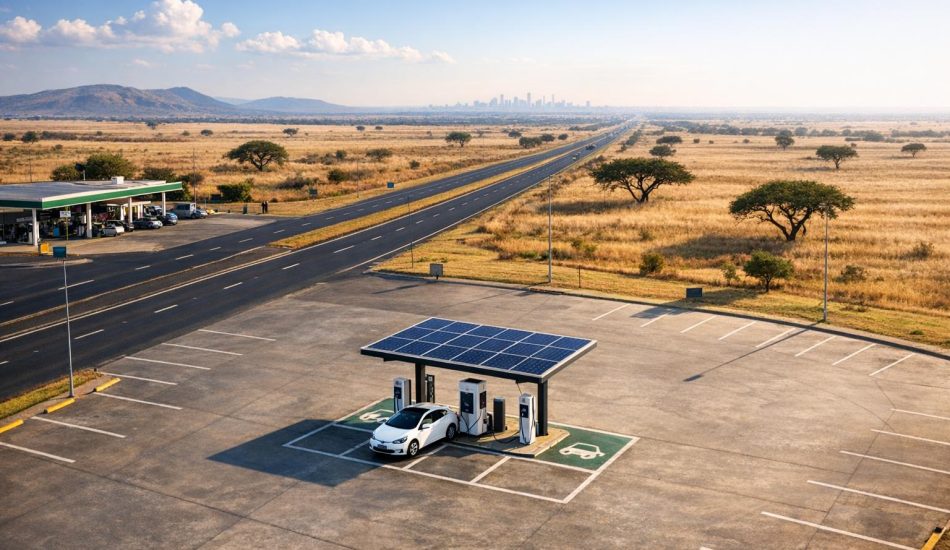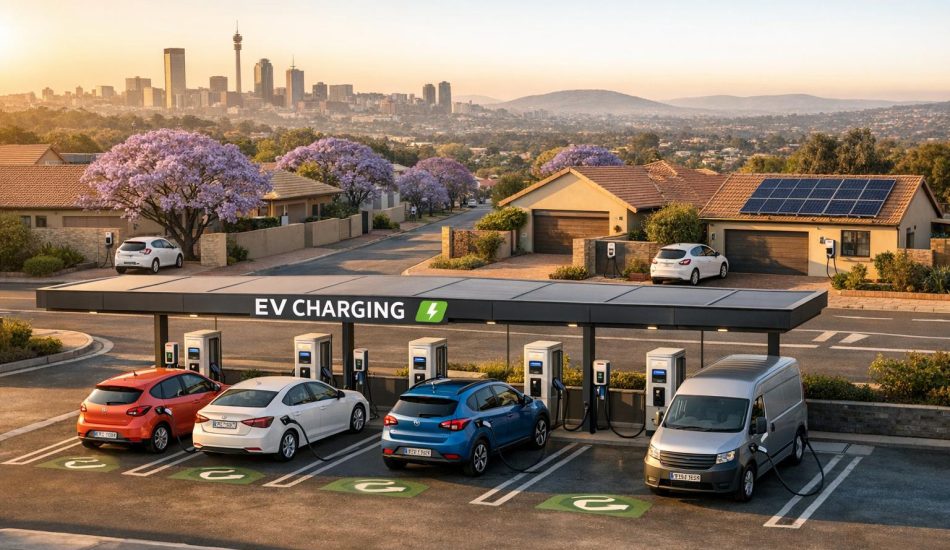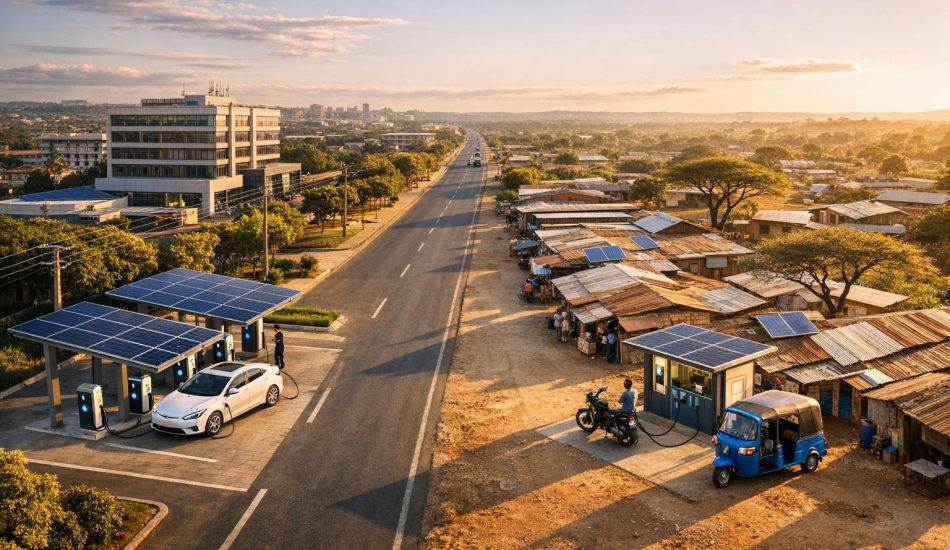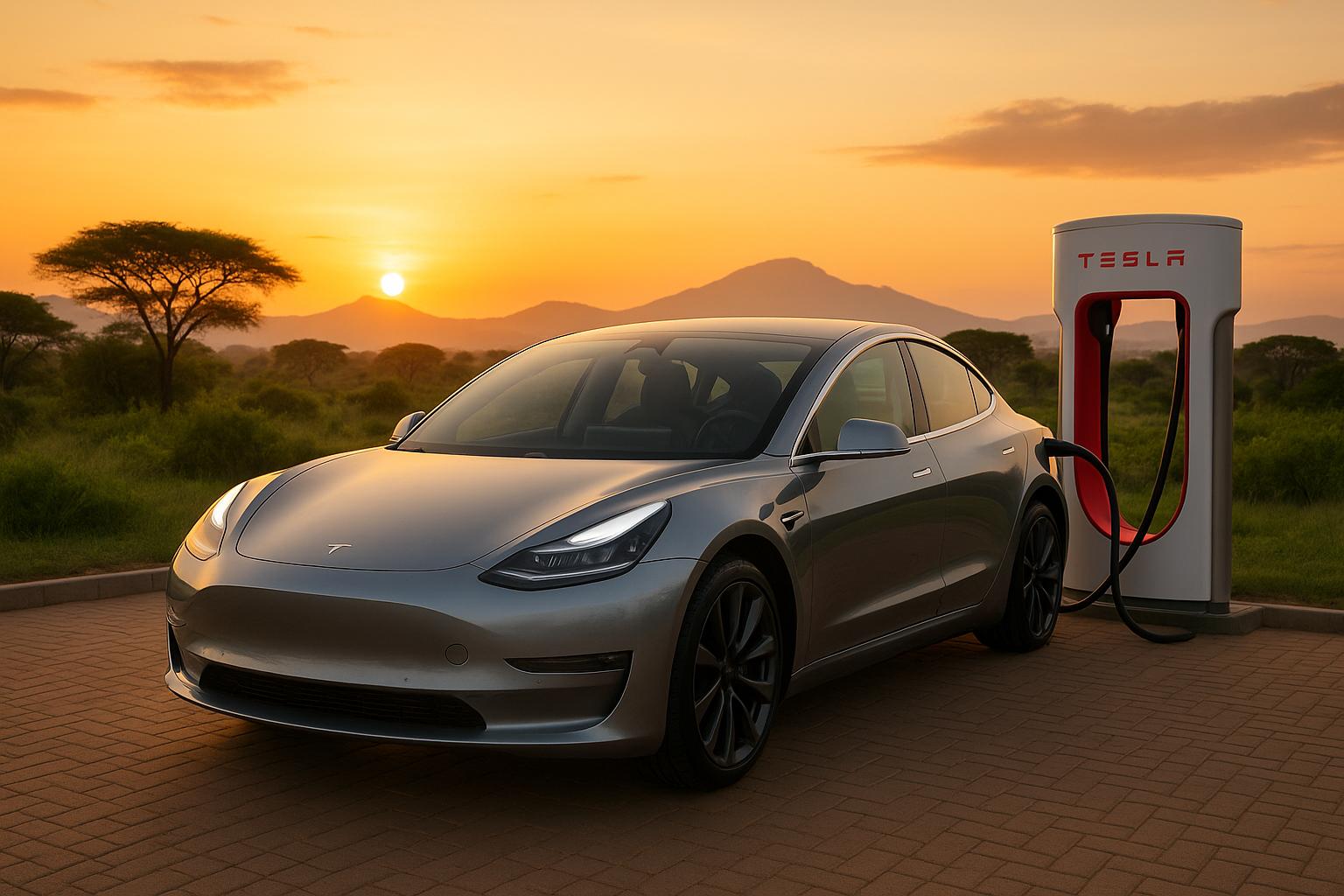
Tesla cars are gaining traction in Tanzania, even though the company doesn’t operate locally. Most vehicles are imported privately, with platforms like EV24.africa simplifying the process. A 2018 Tesla Model 3, for example, costs around $74,000. Import duties and limited financing options make Teslas expensive upfront, but lower running costs offer long-term savings. Charging infrastructure is developing, with 15 public stations and plans for 500 by 2030. Solar charging is also a promising alternative. Tanzania’s renewable energy mix and emerging support systems are making Tesla ownership more feasible.
Tesla Models You Can Buy in Tanzania
Which Tesla Models Are Available
Tesla’s popularity continues to grow worldwide, and Tanzania is no exception. Through EV24.africa, you can find both certified used and new Tesla models. Among the options, the Model 3 stands out as a favorite. For instance, a 2018 Model 3 imported from Dubai is available in Arusha for $74,000 (approximately TSh 172,486,238).
Tesla Prices in Tanzania (2025)
How Much Each Tesla Model Costs
Tesla prices in Tanzania are influenced by several factors, including import duties, shipping fees, the vehicle’s condition, and the buyer’s location. Importing a new Tesla comes with added costs for shipping, insurance, and handling. However, Tanzania has introduced measures like reduced import duties and VAT exemptions, which can cut expenses by up to 25% compared to traditional vehicles. Despite these incentives, other market challenges still affect the overall cost.
For pre-owned Teslas, the price depends on factors like the car’s age, mileage, battery condition, and service history. Well-maintained vehicles with detailed service records tend to be more expensive, but they offer the benefit of immediate availability. Regional differences also play a role – cars in urban hubs like Dar es Salaam typically cost more than those in less accessible areas.
Another key factor impacting affordability is financing. With limited financing options available, most buyers need to pay upfront, which can make owning a Tesla a financial hurdle. As SBT Japan highlights:
The high cost of electric cars and limited charging infrastructure remains a barrier.
These combined factors paint a clear picture of the challenges and considerations for Tesla buyers in Tanzania.
Tesla Specs and Charging in Tanzania
Tesla Performance and Driving Range
Tesla vehicles are well-suited for Tanzania’s varied driving conditions, delivering both efficiency and solid performance. Models like the Model 3, Model Y, Model S, and Model X stand out for their electric powertrains and advanced Autopilot features, which combine safety with a smooth driving experience. Tesla’s battery technology is designed to handle a range of temperatures, ensuring reliable performance across the country’s climate. To get the most out of your Tesla, pairing it with dependable local charging options is essential.
How to Charge Your Tesla in Tanzania
While charging infrastructure in Tanzania is still developing, Tesla owners have several options to keep their vehicles powered. For most, home charging is the most convenient choice. Installing a dedicated charger at home allows for overnight charging, ensuring the car is ready for daily use.
In cities, public charging stations are gradually becoming available. Tesla vehicles can also connect to third-party charging networks using the right adapters. For longer trips, careful planning is essential, and Tesla’s built-in navigation system helps locate nearby charging stations, making road trips more manageable.
Given Tanzania’s abundant sunlight, solar-powered charging is an exciting possibility. By combining solar panels with energy storage systems at home, owners can create a renewable and potentially cost-effective solution for keeping their Teslas charged.
sbb-itb-99e19e3
Tesla’s Future in Tanzania
What to Expect for Tesla Sales
Tesla’s prospects in Tanzania are looking brighter than ever, with the country’s electric vehicle (EV) market expected to grow at an impressive 40.5% compound annual growth rate. The Tanzanian government is also stepping up, with plans to establish 500 charging stations by 2030.
Right now, Tanzania has around 15 public charging stations, most of which are Level 2 chargers located in Dar es Salaam, with one in Zanzibar. However, the National EV Corridor project is set to transform the landscape. This initiative will connect major cities like Dar es Salaam and Mwanza with a robust charging network. Partnerships between public entities like TANESCO and private companies such as Ampersand are making this possible, with added support from international organizations like the World Bank.
Tanzania’s energy profile also works in Tesla’s favor. With 60% of its energy coming from renewable sources and the Julius Nyerere Hydropower Plant delivering 2.1 GW of capacity, Tesla drivers can enjoy sustainable charging options. This setup not only supports zero-emission driving but also lowers operating costs for owners.
The economic benefits of owning a Tesla in Tanzania are clear. For instance, driving an EV for 62 miles typically uses about 15 kWh of electricity, costing just $1.43. Compare that to $7.64 for a gasoline-powered car covering the same distance. With average electricity rates in Tanzania at $0.14 per kWh, Tesla owners can look forward to substantial savings on fuel.
As the market evolves, platforms like EV24.africa are simplifying the process of buying and owning a Tesla.
How EV24.africa Helps Tesla Buyers
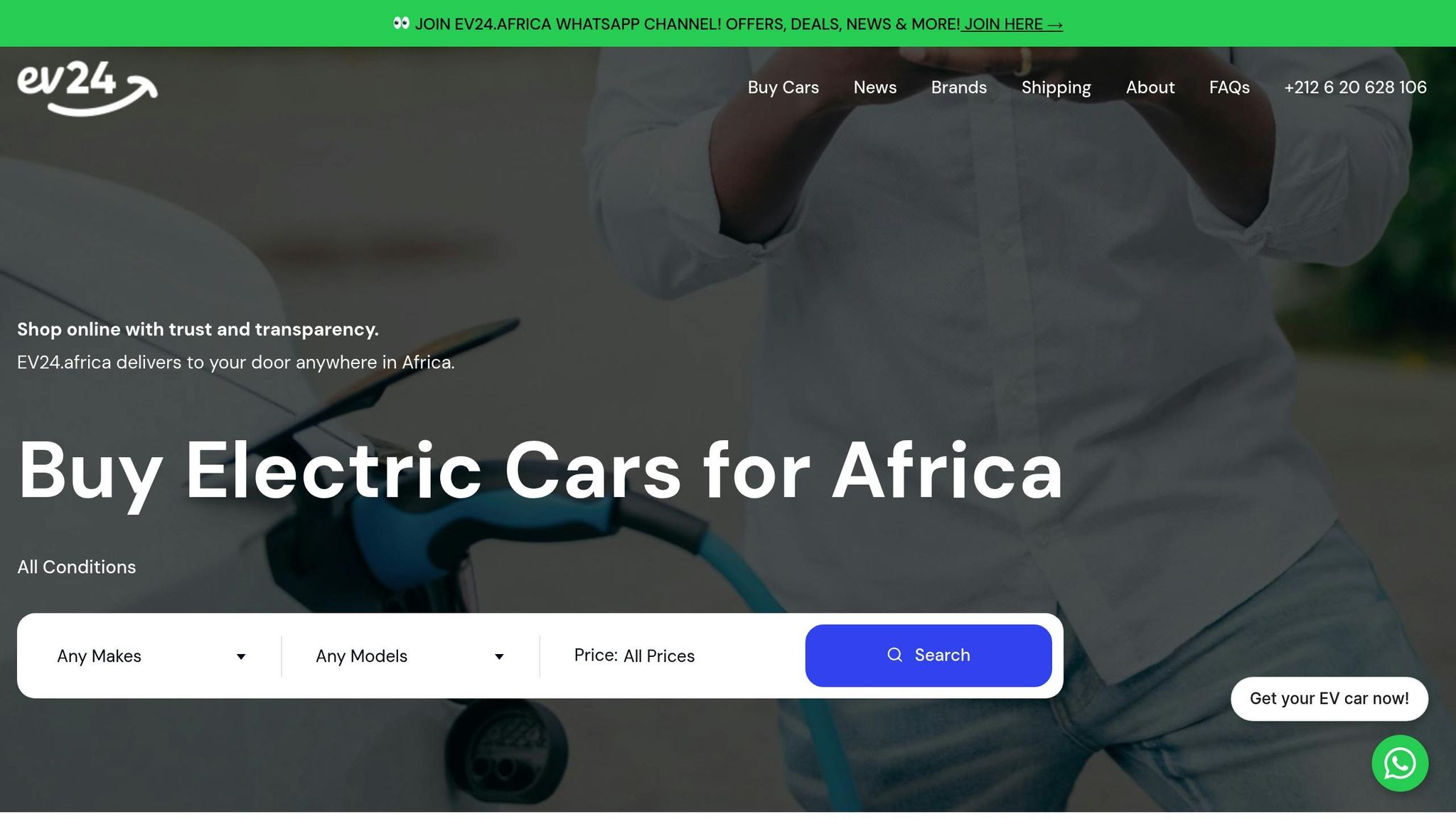
EV24.africa has become the go-to platform for Tesla enthusiasts in Tanzania. Whether you’re looking for a new or used Tesla, this platform connects buyers with tailored financing options, clear pricing, and end-to-end logistical support, making the process far smoother than importing a Tesla independently.
Their delivery services cover all 54 African countries, managing everything from customs paperwork to final delivery, so buyers don’t have to navigate the complexities of importing vehicles on their own.
EV24.africa also offers expert consultation services to help buyers choose the perfect Tesla model based on local driving needs, available charging infrastructure, and Tanzania’s climate. Their team provides advice on model selection, setting up charging stations, and ongoing maintenance.
For after-sales care, the platform connects Tesla owners with certified service providers. They coordinate essential services like maintenance, software updates, and technical support. EV24.africa even assists buyers with finding the best charging solutions, including solar-powered systems that take advantage of Tanzania’s abundant sunshine for energy independence.
Every Tesla listing on the platform includes a detailed cost breakdown, covering import duties, delivery charges, and financing terms. This transparency ensures buyers have all the information they need to make confident decisions – no hidden fees, no surprises.
First Experience in the KES 20 Million First Tesla Model X in Kenya Africa
Final Thoughts on Tesla Cars in Tanzania
Tesla’s arrival in Tanzania signals a shift toward more sustainable transportation options in East Africa. As the demand for electric vehicles grows, more people are beginning to see Tesla as a viable alternative to traditional gasoline-powered cars.
One of the key draws of electric vehicles is their potential to save money in the long run. With generally lower operating costs compared to gas-powered models, Teslas offer an efficient and cost-effective solution for drivers looking to cut down on expenses over time.
Efforts to build the necessary infrastructure for electric vehicles in Tanzania are already underway. Government programs and partnerships between public and private sectors are working to expand charging networks and simplify the import process. These improvements directly address common concerns like charging availability and range limitations, making the idea of owning an EV more practical. Additionally, services designed to assist Tesla buyers are helping smooth the transition to electric driving.
For example, EV24.africa has made importing Teslas easier by offering expert help with customs, logistics, and after-sales support. Their focus on transparency in pricing and dependable customer care has made Tesla ownership more approachable for Tanzanians.
As charging networks grow and import procedures become more efficient, owning a Tesla in Tanzania is shifting from being a niche luxury to a realistic, eco-friendly option for many. With better infrastructure and dedicated support services, Tesla ownership is becoming a more accessible and sustainable choice in the region.
FAQs
What are the long-term financial advantages of owning a Tesla in Tanzania, even with the high initial costs?
Owning a Tesla in Tanzania might seem like a hefty investment at first, but it can lead to substantial savings over time. Electric vehicles like Tesla cost much less to run since electricity is far cheaper than gasoline. In fact, fuel expenses can drop by as much as 86%. On top of that, Teslas are built with fewer moving parts, which means maintenance and repair costs are nearly 50% lower compared to traditional cars.
When you factor in these savings, along with Tesla’s reliability and efficiency, the long-term cost of ownership becomes much more manageable. The upfront cost quickly balances out when you consider the reduced expenses and the benefit of driving a modern, eco-friendly vehicle.
How is Tanzania’s growing charging infrastructure making Tesla ownership more practical?
Tanzania is steadily improving its charging infrastructure, making it easier and more practical to own a Tesla. New developments, like public charging stations and off-grid solar-powered options, are helping bridge gaps in areas where electricity access is limited.
With this growing network, Tesla owners can travel with fewer worries about range and enjoy a more convenient driving experience. These advancements are paving the way for broader adoption of electric vehicles and enhancing what it means to own a Tesla in Tanzania.
What is the Tanzanian government doing to make Tesla cars more affordable and promote sustainable EV adoption?
The Tanzanian government is taking steps to make Tesla vehicles more accessible and encourage the adoption of electric vehicles (EVs) through a range of initiatives. One major move is offering tax exemptions on EV imports, including waivers on VAT and customs duties. These measures could reduce the cost of electric vehicles by as much as 25%.
Beyond cost reductions, the government is also focusing on building a reliable EV charging network to ensure drivers have easy access to charging stations across the country. To support this transition, they are working on establishing clear safety standards, simplifying import regulations, and integrating EVs into the national energy grid. These efforts aim to create a smoother path toward a future powered by electric mobility.


